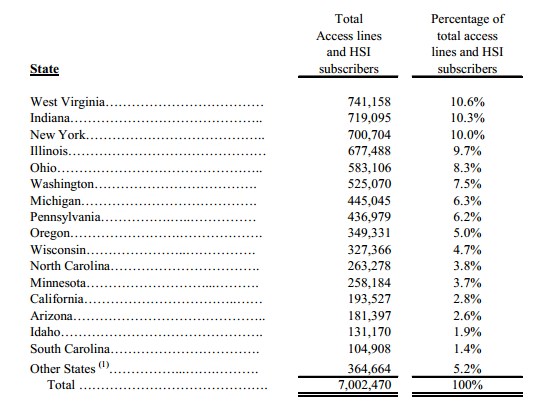 Frontier Communications has confirmed a Stop the Cap! exclusive report that the company has shown an interest in a licensing arrangement with AT&T to deliver U-verse to Frontier customers in larger markets.
Frontier Communications has confirmed a Stop the Cap! exclusive report that the company has shown an interest in a licensing arrangement with AT&T to deliver U-verse to Frontier customers in larger markets.
Maggie Wilderotter, CEO of Frontier Communications today told investors on a morning conference call that the company likes the U-verse product and is considering deploying it.
“We’ve been evaluating a lot of other alternatives of which U-verse is one of the alternatives,” Wilderotter said. “We think it’s a product that can work, not just on fiber, but it also works on copper as well. So it’s a lot more forgiving in the market.”
Wilderotter claimed the company has no immediate plans to introduce the technology, but Stop the Cap! has obtained documentation that shows the company now refers specifically to “U-verse” in internal communications, is hiring new leadership to oversee the company’s IPTV plans, and has plans to dramatically expand VDSL technology, a prerequisite for deploying AT&T’s fiber to the neighborhood platform.
Frontier Communications has had a difficult time supporting its Verizon-inherited FiOS fiber-to-the-home networks in the Pacific Northwest and Indiana. The company has found itself unable to compete effectively in the video business because it negotiates programming contracts independently, which locks Frontier out of the volume discounts that other independent providers routinely receive from participating in programming purchasing co-ops. Frontier lost 4,800 FiOS video customers in the last quarter alone.
Wilderotter said as a result of programming costs, Frontier has no plans to pursue any additional fiber expansion to deliver video programming.
However, a licensing arrangement with AT&T U-verse could open the door to Frontier receiving the same volume discount prices for programming that AT&T already receives as part of its own operations. Because Frontier would have to significantly upgrade its existing, primarily middle-mile fiber network to reduce the amount of copper wiring in its network, the company faces significant capital investment costs wherever it chooses to deploy the more advanced broadband network.
Wilderotter hinted Frontier’s plans for the enhanced technology would be limited to a handful of cities.
“It doesn’t make sense in all of our markets,” she said. “It’s only a handful of markets other than where we have FiOS today. So there’s more to come on that over time. Video is very important. We think over the top video is probably more important than anything else.”
The most likely target for any IPTV expansion would be Frontier’s western New York operation in and around Rochester, where the company currently competes against Time Warner Cable with a mediocre DSL product that can no longer compete with the cable operator’s superior speeds and pricing promotions. Frontier is steadily losing market share in most of its more-populated service areas.
Other likely targets for expanded broadband include larger cities in Pennsylvania, Illinois, West Virginia, and California.
Chief Operating Officer Daniel McCarthy added Frontier also has plans to improve broadband speeds in most of its service areas.
“We’ve been working pretty steadily to improve the core network around the country,” McCarthy said. “You’ll see us aggressively move forward with sort of VDSL and bonded ADSL2 copper.”
Currently, Frontier only informally offers bonded service to residential customers in very limited areas, notably in parts of the Genesee Valley in western New York. The company has been marketing an extra line of traditional ADSL service to customers elsewhere who want more broadband capacity, but that requires a second broadband modem and delivers no speed improvements.
Frontier’s time frame to deploy enhanced speeds in within 12-24 months, according the company officials.
In other developments, Frontier Communications customers formerly served by Verizon will likely find themselves choosing new service plans as Frontier prepares to migrate customers away from legacy Verizon service packages.
Wilderotter telegraphed that affected Frontier customers will see some rate increases when the new plans become effective.
“We do think that there is a pretty substantial revenue upside,” Wilderotter said. “We think the net-net is we’ll get customers on the right portfolio of products that will also be revenue enhancing for the company and we’re going to surround the products with the right kind of service experience, both online and off-line. We’re redesigning all of our online product sets for a better customer experience so they can manage their own broadband usage and actually upgrading or changing what they do with broadband themselves, if in fact, they want to do that.”


 Subscribe
Subscribe


Phil
I don’t know whether Frontier is cutting a deal with AT&T for U-Verse or just Microsoft for the same software AT&T runs for video. But I can confirm they are shopping for hardware that would be just right.
Thanks for this.
db
All of the documentation we are seeing specifically talks about U-verse, with not a word about Microsoft. It is well within precedent for Frontier to sell other companies’ branded products. In this case, it would probably be called Frontier U-verse, with branding credit in the fine print to AT&T.
“Other likely targets for expanded broadband include larger cities in Pennsylvania, Illinois, West Virginia, and California. ”
For Illinois, the most likely larger city/metro would be Bloomington/Normal. It’s their largest Illinois metro. State college town with population of 130K+.
Bloomington has historically been home for major GTE/Verizon/Frontier offices for decades. 1 of the 2 Verizon FiOS satellite farms is just west of Bloomington, Illinois. Verizon had looked at FiOS in Illinois, but had problems dealing with Springfield/state government.
There have been a number of recent complaints on dslreports that customers who transition away from legacy verizon plans to a new plan will find their dsl modems reprovisioned to lower speeds. To add insult to injury they will find themselves also paying a new 6 or 7 dollar per month mandatory modem rental fee that cannot be cancelled even if the customer provides their own modem. Frontier is now cutting speeds on new plans rather than upgrading their backbone capacity. Sub 3 Mbps download speeds for most subscribers now the future of frontier communications. This uverse deployment rumor is… Read more »
Actually, shareholders and Wall Street will probably punish Frontier for the spending they’d have to do to deploy U-verse. Wall Street hates capital investments unless competition absolutely requires a company to do it, and then they gripe the company is spending too much. Frontier is already downplaying the network spend they’ll have to do regarding IPTV, talking in terms of gradually extending enhancements using existing network hardware as much as possible. That’s all code language to appease investors who are afraid the company will have to erode the all-important dividend in order to pay for the upgrades. Wall Street doesn’t… Read more »
My question to Wall Street is, what happens if they find out that the Stock Exchange or their trading tools are downgraded to operate on a 768kbps connection and their rapid buy/sell systems are ground to a halt waiting for everything to transfer, especially if they are trade from home? They won’t be laughing to the bank at that point, they’ll be upset that they cannot make money fast enough 🙂 Some crazy Day-Trade systems I’ve seen throughout the Internet typically run off of a few Cable modems tied into a shelf of high end computers or a Fiber connection… Read more »